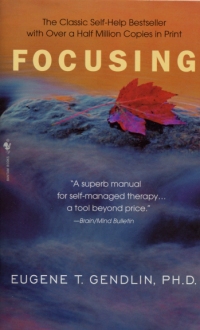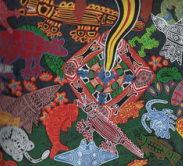
Gendlin's Let Your Body Interpret Your Dreams helped me, an undergrad caught up in the rip tide of U of Chicago. He taught in the Psychology dept and I now wish I'd taken a class from him. But I was consumed by the auto-hypnosis experiments of the charismatic Erika Fromm in those years, traveling like Billy Pilgrim through self-hypnotic time zones, turning myself into a tomato, growing wings. So recently arrived as a "mk" from Philippines, the transition was its own awful Wonderland. And I was slowly dissolving, besieged by nightly terrors. My body stitched by worms, decaying in old blood, teeth popping out. Some days I woke so depressed my body ached.
Gendlin's book was practical. His method gave me questions for the nightmares. But more helpful was his description of Focusing: the body's affirmation though a buzzy, shifting feeling when I'd found the right interpretation. My body was willing to reveal the riddle that the unconscious hid. Whenever I named it (Rumpelstiltskin!) a surge of energy surged forth. Many years later, Gendlin promotes "Thinking at the Edge" through his Focusing Institute.
"Focusing is the murky edge…" the limit situation, the place in ourselves that is inchoate. Our ability to focus helps us slog into the mud of our murk with a confidence that our intuition has its own GPS.
Which leads me to Flow. The wild red-haired Mihaly Csikszentmihalyi, taught in our Common Core. (You'd think I majored in psych.) The impossible-to-spell genius was testing wellbeing at the school where "fun goes to die." Flow, he says in this Ted talk, is a mode of self absorption that draws you into action and creativity. It strikes me as similar to the mindfulness that Ellen Langer has theorized about for several decades now, as too, Seligman's notion of flourishing. Mindfulness and flow restore the body-mind divide through the intuition and imagination to give us a more expansive way of being past our social instrumentality. They free us from the lock-down of our routinized life.
Is this solipsim? We are on the juggernaut careening towards social change and its chaos: economic stress, personal hardship, conflict, disaster, collapse. Is positive psychology a panacea? What might focusing, flow, mindfulness, florishing teach us about resilience?
Gendlin's book was practical. His method gave me questions for the nightmares. But more helpful was his description of Focusing: the body's affirmation though a buzzy, shifting feeling when I'd found the right interpretation. My body was willing to reveal the riddle that the unconscious hid. Whenever I named it (Rumpelstiltskin!) a surge of energy surged forth. Many years later, Gendlin promotes "Thinking at the Edge" through his Focusing Institute.
"Focusing is the murky edge…" the limit situation, the place in ourselves that is inchoate. Our ability to focus helps us slog into the mud of our murk with a confidence that our intuition has its own GPS.
Which leads me to Flow. The wild red-haired Mihaly Csikszentmihalyi, taught in our Common Core. (You'd think I majored in psych.) The impossible-to-spell genius was testing wellbeing at the school where "fun goes to die." Flow, he says in this Ted talk, is a mode of self absorption that draws you into action and creativity. It strikes me as similar to the mindfulness that Ellen Langer has theorized about for several decades now, as too, Seligman's notion of flourishing. Mindfulness and flow restore the body-mind divide through the intuition and imagination to give us a more expansive way of being past our social instrumentality. They free us from the lock-down of our routinized life.
Is this solipsim? We are on the juggernaut careening towards social change and its chaos: economic stress, personal hardship, conflict, disaster, collapse. Is positive psychology a panacea? What might focusing, flow, mindfulness, florishing teach us about resilience?


 RSS Feed
RSS Feed
